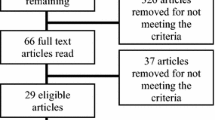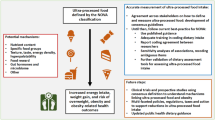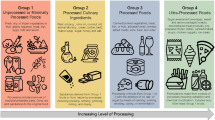Abstract
Objectives
The Truth and Reconciliation Commission includes a call to action to close gaps in health outcomes, including type 2 diabetes, of which diet quality must be considered an important mediator. The objectives of this study were to compare diet quality between off-reserve Indigenous and non-Indigenous adults in 2004 and 2015, and examine food security as a predictor of diet quality.
Methods
We employed a repeated cross-sectional design using the 2004 and 2015 Canadian Community Health Surveys-Nutrition. Both surveys include a representative sample of the Canadian population in the 10 provinces, excluding the northern territories and people living on-reserve. Healthy Eating Index (HEI) values were estimated, using 24-hour dietary recalls, for the Indigenous and non-Indigenous population in each time period. After matching, a generalized linear model was applied to test for differences in HEI between groups across time period, adjusting for household food security.
Results
Overall, HEI scores were not significantly different for Indigenous men and women in 2015 as compared with 2004, but continued to be lower compared with those of the non-Indigenous population. Indigenous adults reported significantly lower diet quality independent of food security status and other factors. Scores pertaining to percent energy from ‘other’ foods improved in 2015 compared with 2004.
Conclusion
Dietary disparities persist between Indigenous and non-Indigenous populations. While addressing household food insecurity among Indigenous populations is necessary to improve diet quality, it is not sufficient. Results suggest that factors other than food insecurity and socio-economic status are impacting disparities in diet quality among Indigenous adults.
Résumé
Objectifs
L’un des appels à l’action lancé par la Commission de vérité et réconciliation vise à combler les écarts dans les résultats cliniques, notamment pour le diabète de type 2, dont la qualité du régime doit être considérée comme un médiateur important. Nous avons cherché à comparer la qualité du régime des adultes autochtones vivant hors réserve et des adultes non autochtones en 2004 et en 2015 et à examiner la sécurité alimentaire comme variable prédictive de la qualité du régime.
Méthode
Nous avons employé un plan transversal répété en utilisant les Enquêtes sur la santé dans les collectivités canadiennes – Nutrition de 2004 et de 2015. Les deux enquêtes incluent un échantillon représentatif de la population canadienne dans les 10 provinces, sans les territoires nordiques ni les populations vivant dans les réserves. Les valeurs de l’Indice d’alimentation saine (IAS) ont été estimées, à l’aide de rappels alimentaires de 24 heures, pour la population autochtone et non autochtone durant chaque intervalle. Après appariement des données, nous avons appliqué un modèle linéaire généralisé pour découvrir les différentes valeurs de l’IAS entre les groupes au fil du temps, en apportant des ajustements pour tenir compte de la sécurité alimentaire des ménages.
Résultats
Dans l’ensemble, les valeurs de l’IAS n’étaient pas significativement différentes chez les hommes et les femmes autochtones en 2015 comparativement à 2004, mais elles restaient inférieures aux valeurs de l’IAS pour la population non autochtone. Les adultes autochtones ont déclaré une qualité du régime significativement inférieure, indépendamment de leur statut de sécurité alimentaire et d’autres facteurs. Les valeurs afférentes au pourcentage d’énergie provenant d’ « autres » aliments s’étaient améliorées en 2015 par rapport à 2004.
Conclusion
Les disparités du régime alimentaire persistent entre les populations autochtones et non autochtones. Bien qu’il soit nécessaire d’aborder l’insécurité alimentaire des ménages dans les populations autochtones pour améliorer la qualité du régime, ce n’est pas suffisant. Nos résultats indiquent que d’autres facteurs que l’insécurité alimentaire et le statut socioéconomique accentuent les disparités dans la qualité du régime chez les adultes autochtones.
Similar content being viewed by others
Notes
Indigenous People in Canada are composed of First Nations, Métis, and Inuit, as defined in Section 35 of the Canadian Constitution of 1982. Where applicable we have used the most specific name to refer to the Indigenous group or population.
References
Aguiar, W., & Halseth, R. (2015). Aboriginal Peoples and historic trauma. National Collaborating Center for Aboriginal Health. https://www.ccnsa-nccah.ca/Publications/Lists/Publications/Attachments/142/2015-04-28-AguiarHalseth-RPT-IntergenTraumaHistory-EN-Web.pdf. Accessed 10 September 2020.
Cidro, J., Adekunle, B., Peters, E., & Martens, T. (2015). Beyond food security: Understanding access to cultural food for urban Indigenous people in Winnipeg as Indigenous food sovereignty. Canadian Journal of Urban Research, 24, 24–43.
Diabetes Canada Clinical Practice Guidelines Expert Committee. (2018). Diabetes Canada 2018 clinical practice guidelines for the prevention and management of diabetes in Canada. Canadian Journal of Diabetes, 42(Suppl 1), S1–S325.
Echeverri-Alvarado, B., Pickett, S., & Gildner, D. (2020). A model of post-traumatic stress symptoms on binge eating through emotion regulation difficulties and emotional eating. Appetite, 150, 104659. https://doi.org/10.1016/j.appet.2020.104659
Garriguet, D. (2008). Obesity and the eating habits of the Aboriginal population. Health Reports, 19(1), 21.
Garriguet, D. (2009). Diet quality in Canada. Health Reports, 20(3), 41–52.
Garriguet, D. (2018). Accounting for misreporting when comparing energy intake across time in Canada. Health Reports, 29(5), 3–12.
Government of Canada. (2020). Canada’s food guide. https://food-guide.canada.ca/en/. Accessed 10 September 2020.
Green, M. E., Jones, C. R., Walker, J. D., Shah, B. R., Jacklin, K., Slater, M., & Frymire, E. (2019). First Nations and diabetes in Ontario. ICES.
Halseth, R. (2019). The prevalence of type 2 diabetes among First Nations and considerations for prevention. National Collaborating Centre for Aboriginal Health.
Health Canada. (2006a). Canadian Community Health Survey, Cycle 2.2, Nutrition (2004). A guide to accessing and interpreting the data. Ottawa: Minister of Health, Office of Nutrition Policy and Promotion, Health Products and Food Branch, Health Canada. https://www.canada.ca/en/health-canada/services/food-nutrition/food-nutrition-surveillance/health-nutrition-surveys/canadian-community-health-survey-cchs/canadian-community-health-survey-cycle-2-2-nutrition-2004-guide-accessing-interpreting-data-health-canada-2006.html. Accessed 10 September 2020.
Health Canada. (2006b). Dietary reference intakes tables. http://www.hc-sc.gc.ca/fn-an/nutrition/reference/table/index-eng.php. Accessed 10 September 2020.
Health Canada. (2008). Canadian Community Health Survey, Cycle 2.2, Nutrition (2004): Income-related household food security in Canada. http://www.hc-sc.gc.ca/fn-an/surveill/nutrition/commun/income_food_sec-sec_alim-eng.php#appa. Accessed 10 September 2020.
Health Canada. (2017). Reference guide to understanding and using the data: 2015 Canadian Community Health Survey-Nutrition. https://www.canada.ca/content/dam/hc-sc/documents/services/food-nutrition/food-nutrition-surveillance/ReferenceGuide2015CCHS-Nutr_Eng_Final_06192017.pdf. Accessed 27 June 2021.
Iacus, S., King, G., & Porro, G. (2012). Causal inference without balance checking: Coarsened exact matching. Political Analysis, 20(1), 1–24. https://doi.org/10.1093/pan/mpr013
Jeon, S. H. (2014). The effects of cancer on employment and earnings of cancer survivors. Statistics Canada.
Kirkpatrick, S., & Tarasuk, V. (2008). Food insecurity is associated with nutrient inadequacies among Canadian adults and adolescents. Journal of Nutrition, 138, 604–612.
Leung, C., & Tester, J. (2019). The association between food insecurity and diet quality varies by race/ethnicity: An analysis of national health and nutrition examination survey 2011-2014 results. Journal of the Academy of Nutrition and Dietetics, 119(10), 1676–1686. https://doi.org/10.1016/j.jand.2018.10.011
Martens, P., Bartlett, J., Burland, E., Prior, H., Burchill, C., Huq, S., Romphf, L., Sanguins, J., Carter, S., & Bailly, A. (2010). Profile of Metis health status and healthcare utilization in Manitoba: A population-based study. Manitoba Centre for Health Policy.
Mason, S. M., Ayour, N., Canney, S., Eisenberg, M. E., & Neumark-Sztainer, D. (2017). Intimate partner violence and 5-year weight change in young women: A longitudinal study. Journal of Women's Health, 26(6), 677–682.
McIntyre, L., Bartoo, A., & Emery, J. (2014). When working is not enough: food insecurity in the Canadian labour force. Public Health Nutrition, 17(1), 49–57.
Men, F., Gundersen, C., Urquia, M. L., & Tarasuk, V. (2020). Association between household food insecurity and mortality in Canada: A population-based retrospective cohort study. CMAJ, 192(3), E53–E60.
Morrison, D. (2011). Indigenous food sovereignty: A model for social learning. In H. Wittman, A. Desmarais, & N. Wiebe (Eds.), Food sovereignty in Canada: creating just and sustainable food systems (pp. 97–113). Fernwood Publishing.
Mudryj, A., Waugh, A., Slater, J., Duerksen, D., Bernstein, C., & Riediger, N. D. (2021). Dietary gluten avoidance in Canada: Results from the cross-sectional 2015 Canadian Community Health Survey. Canadian Medical Association Journal Open, 9(2), E317–E323.
National Cancer Institute. (2020). Usual dietary intakes: The NCI Method. https://epi.grants.cancer.gov/diet/usualintakes/method.html. Accessed 10 September 2020.
Public Health Agency of Canada (PHAC). (2018). Key health inequalities in Canada: A national portrait. Pan-Canadian Public Health Network.
Randall, J. R., Svenson, L., Eurich, D., & Colquhoun, A., Varughese, M., DeWitt, E., Bradburn, K., Carriere, C., Voaklander, D. (2019). Amongst the Métis Nation of Alberta. http://albertametis.com/wp-content/uploads/2019/06/Diabetes-Report-v11-PressReady.pdf. Accessed 3 April 2021.
Richmond, C., Kerr, R. B., Neufeld, H., Steckley, M., Wilson, K., & Dokis, B. (2021). Supporting food security for Indigenous families through the restoration of Indigenous foodways. The Canadian Geographer, 65(1), 97–109.
Riediger, N. D., LaPlante, J., Mudryj, A., & Clair, L. (2021). Diet quality among Indigenous and non-Indigenous children and youth in Canada in 2004 and 2015: A repeated cross-sectional design. Public Health Nutrition, in press. https://doi.org/10.1017/S1368980021002561
Ruth, C., Sellers, E., Chartrand, C., McLeod, L., Prior, H., Sirski, M., Dragan, R., Chen, H., McDougall, C., & Schultz, J. (2020). People with type 2 diabetes in Manitoba. Manitoba Centre for Health Policy.
Shah, B., Cauch-Dudek, K., & Fangyun Wu, C. (2010). Diabetes in the Métis Nation of Ontario. Metis Nation of Ontario.
Smylie, J., & Anderson, M. (2006). Understanding the health of Indigenous peoples in Canada: Key methodological and conceptual challenges. Canadian Medical Association Journal (CMAJ), 175(6), 602–602. https://doi.org/10.1503/cmaj.060940
Springer, K., Sheridan, J., Kuo, D., & Carnes, M. (2003). The long-term health outcomes of childhood abuse: An overview and a call to action. Journal of General Internal Medicine, 18(10), 864–870. https://doi.org/10.1046/j.1525-1497.2003.20918.x
Statistics Canada. (2016). 150 years of immigration in Canada. https://www150.statcan.gc.ca/n1/pub/11-630-x/11-630-x2016006-eng.htm
Statistics Canada. (2017a). Canadian Community Health Survey-Nutrition (CCHS). https://www23.statcan.gc.ca/imdb/p2SV.pl?Function=getSurvey&SDDS=5049. Accessed 10 September 2020.
Statistics Canada. (2017b). Aboriginal peoples in Canada: Key results from the 2016 census. https://www150.statcan.gc.ca/n1/daily-quotidien/171025/dq171025a-eng.htm. Accessed September 9, 2020.
Tait, C., L’Abbé, M., Smith, P., & Rosella, L. (2018). The association between food insecurity and incident type 2 diabetes in Canada: A population-based cohort study. PloS One, 13(5), e0195962. https://doi.org/10.1371/journal.pone.0195962
Tarasuk, V., Li, N., Dachner, N., & Mitchell, A. (2019). Household food insecurity in Ontario during a period of poverty reduction, 2005–2014. Canadian Public Policy, 45(1), 93–104. https://doi.org/10.3138/cpp.2018-054
Truth and Reconciliation Commission of Canada: Calls to Action. (2015). http://trc.ca/assets/pdf/Calls_to_Action_English2.pdf Accessed 10 September 2020.
Wallace, S. (2014). Inuit health: Selected findings from the 2012 Aboriginal Peoples Survey. Statistics Canada - Catalogue no. 89-653 -No. 003. https://publications.gc.ca/collections/collection_2014/statcan/89-653-x/89-653-x2014003-eng.pdf
Willows, N., Veugelers, P. Raine, K., Kuhle, S. (2011). Associations between household food insecurity and health outcomes in the Aboriginal population (excluding reserves). Health Reports, 22(2), Catalogue no. 82-003-XPE.
Willows, N., Johnson-Down, L., Kenny, T., Chan, H., & Batal, M. (2019). Modelling optimal diets for quality and cost: Examples from Inuit and First Nations communities in Canada. Applied Physiology, Nutrition, and Metabolism, 44(7), 696–703. https://doi.org/10.1139/apnm-2018-0624
Working Group on Indigenous Food Sovereignty. (2011). Indigenous food sovereignty. http://www.indigenousfoodsystems.org/food-sovereignty. Accessed 10 September 2020.
Acknowledgements
We would like to acknowledge Didier Garriguet of Statistics Canada for graciously sharing code with us in developing the Healthy Eating Index variable. We thank Dr. Joyce Slater for her review and feedback on earlier drafts. We also thank Riel Dubois for his feedback on these results and manuscript, and for hosting a community event with us in Winnipeg to share these results and obtain feedback from community members. Last, we thank the anonymous reviewers for their generous feedback, which greatly improved the manuscript.
Availability of data and material
Data are available through Canadian Research Data Centres (https://crdcn.org/).
Code availability
Please contact the corresponding author for code.
Funding
This work was funded by the Canadian Institutes of Health Research (CIHR), Canadian Community Health Survey Nutrition Analysis (Grant #151546). NDR is the recipient of a CIHR Early Career Investigator Award (2018-2022; grant #155435). Research at the Manitoba Research Data Centre is supported by funds to the Canadian Research Data Centre Network (CRDCN) from the Social Sciences and Humanities Research Council (SSHRC), CIHR, the Canadian Foundation for Innovation (CFI), and Statistics Canada. Although the research and analysis are based on data from Statistics Canada, the opinions expressed do not represent the views of Statistics Canada.
Author information
Authors and Affiliations
Contributions
NR was involved in formulating the research question, designing the study, carrying it out, and writing the article. JL was involved in formulating the research question, designing the study, contributing to interpretation, and reviewing the manuscript for intellectual content. AM was involved in designing the study, carrying it out, analyzing the data, contributing to interpretation, and reviewing the manuscript for intellectual content. LC was involved in designing the study, carrying it out, analyzing the data, contributing to interpretation, and reviewing the manuscript for intellectual content.
Corresponding author
Ethics declarations
Conflict of interest
The authors declare no competing interests.
Ethics approval
This article does not contain any studies with human participants performed by any of the authors. All procedures performed in studies involving human participants were in accordance with the ethical standards of Statistics Canada (Microdata research contract 17-SSH-WIN-5184) and with the 1964 Helsinki declaration and its later amendments or comparable ethical standards.
Consent to participate
Informed consent was obtained from all individual participants included in the study.
Additional information
Publisher’s note
Springer Nature remains neutral with regard to jurisdictional claims in published maps and institutional affiliations.
Rights and permissions
About this article
Cite this article
Riediger, N.D., LaPlante, J., Mudryj, A. et al. Examining differences in diet quality between Canadian Indigenous and non-Indigenous adults: results from the 2004 and 2015 Canadian Community Health Survey Nutrition Surveys. Can J Public Health 113, 374–384 (2022). https://doi.org/10.17269/s41997-021-00580-x
Received:
Accepted:
Published:
Issue Date:
DOI: https://doi.org/10.17269/s41997-021-00580-x
Keywords
- Diet quality
- Healthy Eating Index
- Canadian Community Health Survey
- Food security
- Indigenous
- First Nations
- Off-reserve
- Métis




